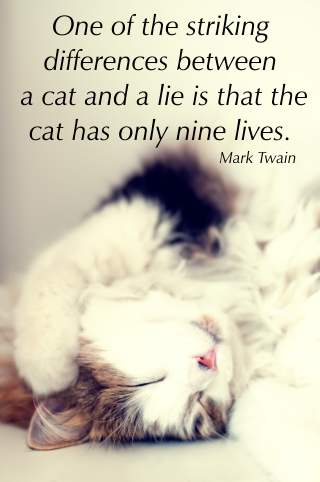










Popular Articles
Crazy-Makers: Dealing with Passive-Aggressive People
Why Are People Mean? Don't Take It Personally!
Struggling to Forgive: An Inability to Grieve
The Secret of Happiness: Let It Find You (But Make the Effort)
20 Steps to Better Self-Esteem
7 Rules and 8 Methods for Responding to Passive-aggressive People
What to Do When Your Jealousy Threatens to Destroy Your Marriage
Guide to How to Set Achieveable Goals
Catastrophe? Or Inconvenience?
Popular Audios
Audio Version of Article: Crazy-Makers: Passive-Aggressive People
Audio Version of Article: Why Are People Mean? Don't Take It Personally!
PsychNotes February 2017
by Monica A. Frank, Ph.D.
Clinical and Sport Psychologist

Index
Previous
Next
February 27, 2017
Even though forensic psychologists have developed elaborate procedures to improve the ability to determine truth to aid in criminal prosecution, there is still much room for error. If one of the most motivated areas of research to determine lying can't reliably assess the truth, shouldn't you be careful before accusing someone of lying?
Even with training, social-workers only increased their detection abilities to 77% while police officers were in the 50-60% range (Akehurst et al., 2004). While 77% may seem high, it still means these professionals are wrong 30-40% of the time. Yet, even when wrong, they were confident in their assessment. Such confidence is the crux of the matter—when a person is confident, they are more likely to make accusations. Read more...
Be Careful Accusing Someone of Lying
Even with training, social-workers only increased their detection abilities to 77% while police officers were in the 50-60% range (Akehurst et al., 2004). While 77% may seem high, it still means these professionals are wrong 30-40% of the time. Yet, even when wrong, they were confident in their assessment. Such confidence is the crux of the matter—when a person is confident, they are more likely to make accusations. Read more...

February 23, 2017
“Just smile.”
“Look at the positive.”
“Do something that is fun.”
Although commonly heard by those with depression, messages such as these have little impact on depression. And then the very unhelpful follow-up (whether thought or said) is frequently: “You're not really trying.”
Let's look at these messages from a purely physical point of view. What if a person with chronic pain was given these same messages? Do you think it would help? That if only they would try to be more positive, they wouldn't hurt so much? Read more...
Why People with Depression Avoid Positive Experiences: or, It's Impossible to Pull Yourself Up by Your Bootstraps
“Look at the positive.”
“Do something that is fun.”
Although commonly heard by those with depression, messages such as these have little impact on depression. And then the very unhelpful follow-up (whether thought or said) is frequently: “You're not really trying.”
Let's look at these messages from a purely physical point of view. What if a person with chronic pain was given these same messages? Do you think it would help? That if only they would try to be more positive, they wouldn't hurt so much? Read more...

February 22, 2017
Clearly, the research shows that happier people are healthier. It makes sense that if you are happier, you are more likely to take better care of yourself which increases health outcomes. But this fact can be discouraging for people who are not happy and can create an ever-downward spiral: unhappiness contributes to poor health and poor health further decreases happiness.
However, there is some good news for unhappy people: did you know that having a happy partner can improve your health? This is true even if you are not happy yourself (Chopik and O'Brien, 2017). Read more...
Happy Friends Can Improve Your Health
However, there is some good news for unhappy people: did you know that having a happy partner can improve your health? This is true even if you are not happy yourself (Chopik and O'Brien, 2017). Read more...

February 17, 2017
Forgiveness is the most precious but arduous gift a person can give to another. We struggle with forgiveness because we are in pain, we are angry that someone caused that pain, we want them to hurt as much as we do but we believe they don't feel regret, guilt or shame.
Yet, in many situations the struggle with forgiveness is due to an overestimation of the intent of the offender and an underestimation of their desire to be forgiven (Adams and Inesi, 2016). When a person is hurt by another, the tendency is to believe that the other person did it deliberately and doesn't care about the pain they caused.
However, in many situations that assumption is not true. Frequently, the transgressor didn't intend to cause pain and desires to be forgiven. Forgiveness is a requirement of healthy relationships because none of us are perfect and each of us is likely to be in the role of an offender and of a victim at different points in a relationship. Read more...
Perspective, Empathy, and Forgiveness
Yet, in many situations the struggle with forgiveness is due to an overestimation of the intent of the offender and an underestimation of their desire to be forgiven (Adams and Inesi, 2016). When a person is hurt by another, the tendency is to believe that the other person did it deliberately and doesn't care about the pain they caused.
However, in many situations that assumption is not true. Frequently, the transgressor didn't intend to cause pain and desires to be forgiven. Forgiveness is a requirement of healthy relationships because none of us are perfect and each of us is likely to be in the role of an offender and of a victim at different points in a relationship. Read more...

February 13, 2017
Some people need to keep moving, thinking, even worrying to prevent awareness of certain thoughts, emotions, or images buried in their subconscious. When they slow down, when they relax, they are less on guard which gives these thoughts or images purchase in their minds.
And it's not always the initial thoughts or images but what they represent and the meaning the person attributes to them. For instance, a person who suffered horrific childhood abuse may judge her or himself harshly and even engage in self-blame. So the avoidance is of their self-criticism and the ongoing injury to their self-concept.
Or, for others it may be the fear of becoming lost in the emotion, feeling overwhelmed and unable to tolerate the intensity of the negative emotions. Read more...
When Anxiety is Caused by Mindfulness Practice
And it's not always the initial thoughts or images but what they represent and the meaning the person attributes to them. For instance, a person who suffered horrific childhood abuse may judge her or himself harshly and even engage in self-blame. So the avoidance is of their self-criticism and the ongoing injury to their self-concept.
Or, for others it may be the fear of becoming lost in the emotion, feeling overwhelmed and unable to tolerate the intensity of the negative emotions. Read more...

February 10, 2017
50 RULES OF LIFE
The inability to change perspective is a frequent cause of conflict. People become so focused on the rightness of their view of the world that they cannot see the value of other views. Yet, most people are often just looking at a narrow slice of a very complex picture.
Perspective is shaped by our expectations and the details we notice. Learning to let go of expectations can help expand our knowledge of the world and our ability to understand others. By doing so, we become more open to ideas and differences which is likely to reduce conflict.
A fable from India illustrates how perspective can be accurate, but inaccurate, at the same time depending upon the specifics observed. Read more...
50 RULES OF LIFE
Rule 18: Perspective--Choose to See the Whole Elephant
Perspective is shaped by our expectations and the details we notice. Learning to let go of expectations can help expand our knowledge of the world and our ability to understand others. By doing so, we become more open to ideas and differences which is likely to reduce conflict.
A fable from India illustrates how perspective can be accurate, but inaccurate, at the same time depending upon the specifics observed. Read more...

February 7, 2017
For most people, the taste of good food or drink is rewarding. And as with anything that is pleasurable, we tend to make choices based on what is most rewarding. However, did you know that the specific food or drink that stimulates the pleasure centers of the brain the most is influenced by how you think about those items (van Rijn, et al., 2017)?
For example, most people have a preference for either Pepsi or Coke—the pleasure region of the brain responds when drinking their preferred beverage. However, when they are given blind taste tests, the brain's reaction shows no preference of one over the other. Therefore, our taste preferences and even the physiological reaction of the brain is affected by how we think. Flavor is enhanced by how you think of the product.
How Something Tastes is Influenced By Your Thinking
For example, most people have a preference for either Pepsi or Coke—the pleasure region of the brain responds when drinking their preferred beverage. However, when they are given blind taste tests, the brain's reaction shows no preference of one over the other. Therefore, our taste preferences and even the physiological reaction of the brain is affected by how we think. Flavor is enhanced by how you think of the product.
Why is this important?
Read more...
February 1, 2017
Although most people are aware, at least at a subconscious level, of the importance of eye contact when communicating, many people still have trouble with this critical component of being assertive. This issue may even be more pressing today with everyone attached to their mobile devices. I have noticed so many conversations in which people are looking at their device rather than the person they are talking with.
Yet, it is still true that if you want to be effective in your communication (i.e. “Win friends and influence people”) you need this basic non-verbal behavior. As simple as it sounds, it can still be difficult for several reasons: Read more...
Assertion 101: The Importance of Eye Contact
Yet, it is still true that if you want to be effective in your communication (i.e. “Win friends and influence people”) you need this basic non-verbal behavior. As simple as it sounds, it can still be difficult for several reasons: Read more...





















